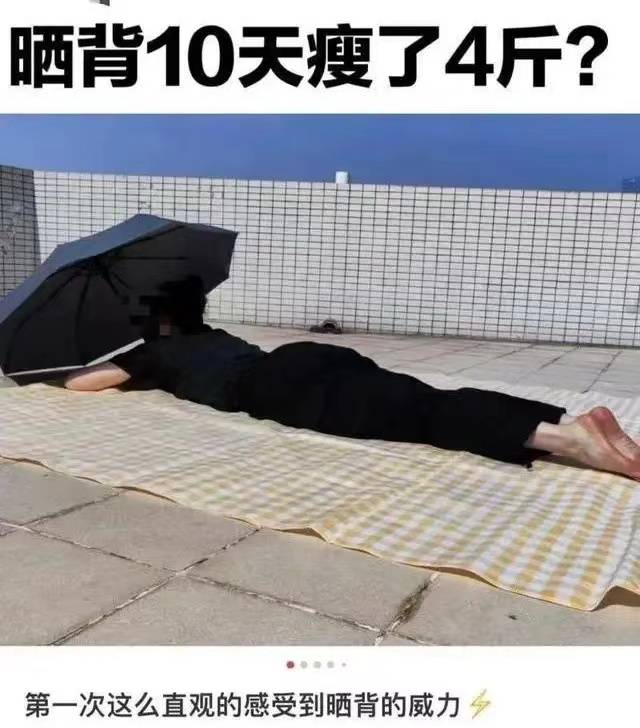As the dog days of summer arrive, a wave of “sunbathing back” sweeps the internet. A woman from Foshan, Guangdong posted that after sunbathing her back on the rooftop for 10 days, she lost 4 jin (about 2 kg) and claimed that sunbathing for half an hour each day made her eyes clearer. Following this, the phrase “Losing 4 jin in 10 days by sunbathing” quickly trended and became a hot topic.
Can it lead to quick weight loss? Can it also promote health and expel dampness? Many people started imitating it. A woman named Yao from Changsha noticed such claims on the internet last year. Working indoors in an air-conditioned room for a long time, she decided to join the “sunbathing back” trend. However, the next day, she woke up with a sore throat, and her tonsils were inflamed, making her realize that sunbathing might not have the miraculous effects as claimed online.
“I still haven’t given up, so I want to continue, but I’m not sure if it’s beneficial or harmful to my body,”
Yao told a reporter from Xiaoxiang Morning News that she learned about the “sunbathing” method on an online platform last year.
Yao, 35 years old this year, often works indoors in air-conditioned rooms during the summer, feeling that her body retains a lot of dampness. When she saw online that “sunbathing” could expel dampness and aid weight loss, she decided to give it a try.
“The sun wasn’t very strong at the time, so I took off my shoes and sunbathed on the balcony at home for an hour.”
Yao said that although she didn’t exercise regularly, her overall health was quite good, rarely getting sick or catching a cold. Tonsil inflammation was even rarer for her. However, after this sunbathing session, her tonsils became severely inflamed the next day, and she couldn’t swallow or eat for four consecutive days.
Yao said that her tonsil inflammation has improved now, but she still attempted sunbathing today. Though the first attempt was not as pleasant as expected, perhaps she didn’t strike the right balance during the initial attempt.
“I’m still not sure if it’s good or bad for my body, but I haven’t given up. Today, I reduced the time I spent sunbathing. I believe sweating a bit more is beneficial, so I want to persist a little longer.”
Netizens: Free “sun moxibustion,” “borrowing a bit of sunshine from the sky”
Some netizens indicate that “sunbathing” does have effects and can become addictive:
However, some netizens express doubts about it:
It is noted that some individuals experienced tonsil inflammation and difficulty swallowing due to sunbathing, similar to Yao’s symptoms.
So, is there any scientific basis for the “sunbathing for weight loss” method mentioned online? Can it prevent “air conditioning sickness”? Xiaoxiang Morning News contacted Director Yang Ping from the Center for Chinese Medicine Diagnosis and Treatment of CNS Diseases at the Second People’s Hospital of Hunan Province (Hunan Provincial Brain Hospital) for answers.
1. Is “sunbathing” suitable for everyone? Does it have a scientific basis?
Yang Ping: The concept of “sunbathing” originates from traditional Chinese medicine. The idea that “sunbathing” can expel dampness has a certain scientific basis, but it is not suitable for everyone.
Sunbathing is suitable for those with yang deficiency and cold-damp constitution, who are sensitive to cold and have cold hands and feet. Dr. Yang Ping added that in Hunan’s geographical climate, the period known as “sanfu days” is the suitable time for sunbathing.
2. “When is the best time for sunbathing?” “Is it harmful to sunbathe on an empty stomach in the morning?” “Should sunscreen be applied before sunbathing?”
Yang Ping: For sunbathing, it is better to do so before 9 a.m. Sunbathing should not be preceded by a bath, ideally done between 7 to 9 a.m. in the morning or after 4 p.m. in the afternoon, for 20-30 minutes. Sunscreen can be applied, and it’s advisable to wear light-colored clothes when sunbathing.
3. Why do some people experience symptoms like tonsil inflammation and throat pain after sunbathing?
Yang Ping: Tonsil inflammation following sunbathing may be due to incorrect timing and duration of sun exposure. Prolonged sun exposure should be avoided. This can also be related to the constitution of the individual; those predisposed to excessive internal heat may experience aggravation after sunbathing.
Yang Ping stated that “sunbathing” does not have therapeutic effects; it is a part of health preservation and does not burn fat, offering little help in weight loss.
According to a report by China Women’s News, there is a certain theoretical basis in traditional Chinese medicine for sunbathing during the dog days of summer.
According to traditional Chinese medicine, sunbathing during the dog days of summer is similar in principle to using “dog days patches.” Both methods stimulate meridian acupoints, bolster yang energy, enhance immunity, promote kidney health, aid in calcium absorption, improve blood circulation, and potentially enhance sleep quality for those with poor sleep.
Traditional Chinese medicine emphasizes the balance of yin and yang, supplementing when deficient. Sunbathing is more suitable for individuals with a deficiency of yang and cold constitution, often exhibiting aversion to wind, cold, recurrent colds, joint pain aggravated by cold, internal coldness, or frequent diarrhea.
The following groups are not suitable for sunbathing:
1. Those sensitive to ultraviolet rays.
2. Individuals with excess yang energy or yin deficiency and yang hyperactivity, who may experience symptoms like fever, sore throat, constipation, etc., following sunbathing.
Additionally, individuals with underlying health conditions, especially those with hypertension, coronary heart disease, pregnant women, and children may benefit from regular sun exposure without specifically sunbathing.
Special groups to avoid sunbathing include those with solar dermatitis, heart disease, tumors, hypertension, and certain diseases. They are not recommended to practice sunbathing for health preservation.
Reporter: Huang Kangrui, Xiaoxiang Morning News


